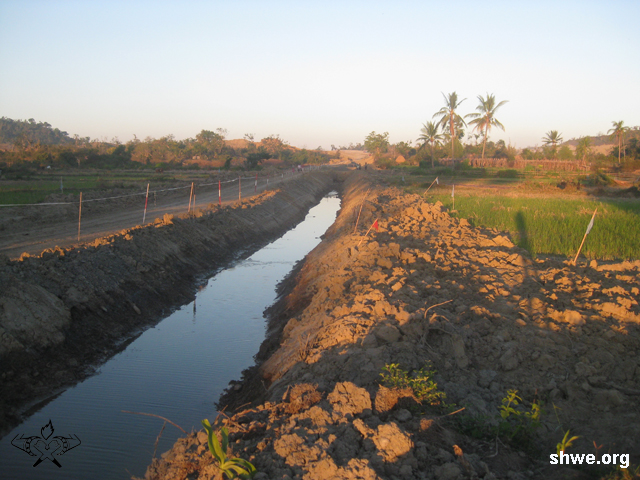Farmers in Magwe division in north-western Burma say they have still not been compensated for the mass destruction of crops caused by the construction of the controversial China-backed Shwe Gas pipeline.
Twenty-six farmers in Saku township’s Latpandaw village say their crops were destroyed when soil was dumped onto their lands during the construction of the project, which will pump oil and gas from Arakan state to western China.
They say huge portions of farmlands were destroyed while local fruit gardens were burnt down to make way for the project, and they have yet to receive any form of compensation.
“They not only dumped soil but also set up a construction camp on my farm – rendering me unable to work on the plot for two solid years,” said Aye Ko, one of the farmers.
“Then upon finalising the construction, they found out the pipeline had been laid in the wrong place and so had to expand the project area. I was unable to grow anything throughout the monsoon last year.”
Another farmer, Hla Win, said: “They bulldozed seven mango and 25 teak trees – I’m just requesting compensation for my loss.”
The local farmers say they reached out to the Land Records Department in Minbu district [encompassing Saku township] during last year’s crop season to demand compensation. The officials reportedly came to inspect the farms and promised that they were working on it, but there has been no progress since.
“They promised us compensation and told us to rest assured – but we haven’t received anything yet.”
Last month the Shwe Gas Movement (SGM), a local advocacy group which campaigns against the pipeline, released a report which slammed the project for setting a “bad example” for future investments in Burma.
It documented serious abuses, including forced labour, land grabs, pollution and an exacerbation of ethnic conflicts in areas near the 800-kilometre pipeline. Dozens of villagers told SGM that toxic waste had been dumped on their properties, despite issuing repeated complaints to their township administrators.
[related]
Faults in the pipeline, which began pumping gas in late July, have also been reported. In mid-September a gas leak burst into flames and terrified residents in Arakan’s Ann township. It follows a report by the Northern Shan Farmers Committee in April, which included photographs of visible holes scarring the pipeline.
“They fixed the holes in the pipeline with rubber patches, like fixing a tyre puncture,” said the report.
Burma, which is slowly emerging from decades of military rule, is rich in gems, industrial minerals, oil, and offshore natural gas reserves estimated at 10 trillion cubic feet.
The Shwe Gas pipeline is a joint venture between the state-owned China National Petroleum Corporation (CNPC) and the military-owned Myanma Oil and Gas Enterprise (MOGE), and is expected to earn Burma US$1.8 billion annually – totaling US$54 billion over 30 years of operation.



